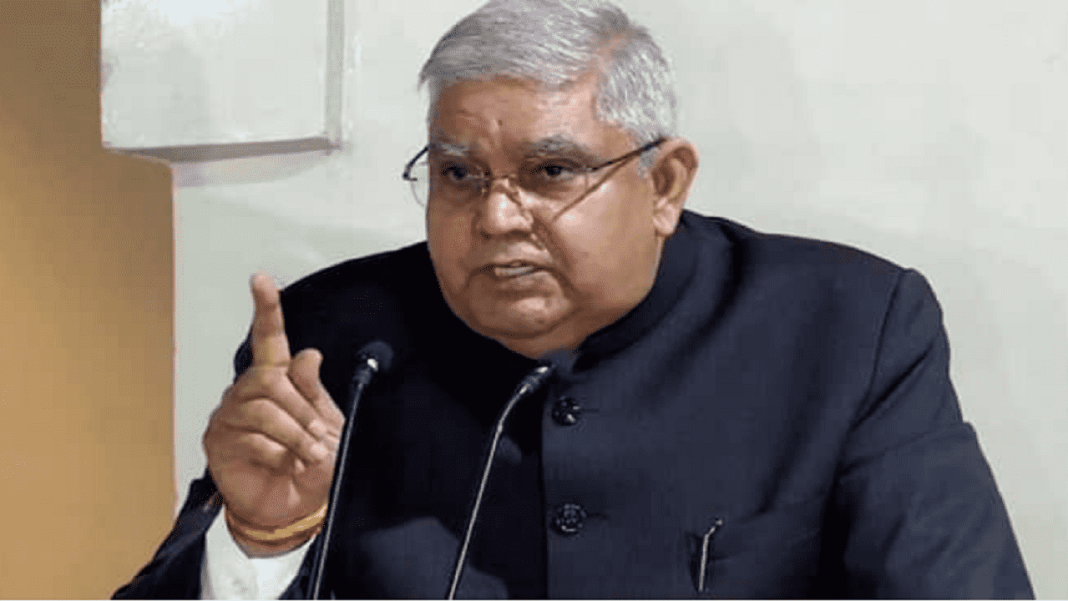Expressing serious concern over the judges trying to perform the functions of the Executive and acting as super Parliament, Vice President and Rajya Sabha Chairman Jagdeep Dhankar on Thursday said that the incursion by one pillar of democracy into other’s domain posed a serious challenge to democracy.
Speaking at the valedictory function of the 6th Rajya Sabha Internship Program at Vice-President’s Enclave, Dhankhar referred to the recent judgment delivered by the Supreme Court on interpretation of powers of a State Governor and the President of India, in relation to the passing of bills.
He said recently, a directive was issued by the Apex Court to the President of India. The country never bargained for this day, for the President being called upon to decide in a time-bound manner. If the President failed to decide in a time-bound manner, the Bill would become a law.
Taking a dig at the judges, the Rajya Sabha Chairman said the judges of the country would now legislate, perform executive functions and act as super Parliament. There was absolutely have no accountability since the law of the land did not apply to them, he added.
Noting that the Parliament could not script a judgement of a court, Dhankhar said it could only legislate and hold institutions, including the Judiciary and the Executive accountable.
Authoring a judgement and adjudication was the sole prerogative of judiciary as much as legislation was that of the Parliament, he noted, questioning whether the same was being challenged.
Dhankhar said he was pained to find executive governance in judicial orders.
When the executive and the government was elected by people, the government was accountable to the Parliament and the people. There was a principle of accountability in operation. In both the Lok Sabha and the Rajya Sabha, a Member of Parliament (MP) could ask critical questions, because the governance was by the executive but if this executive governance was by judiciary, then how could someone ask questions? Who would be held accountable in elections, he asked.
He said any incursion by one institution into the domain of the other posed a challenge, which was not good for democracy.
Speaking about Article 142 of the Constitution, which gave special powers to the Supreme Court, Dhankhar said it had become a nuclear missile against democratic forces, available to the judiciary 24×7.
Dhankhar further took a dig against the procedure in place to investigate the allegations against judges.
Referred to the alleged recovery of unaccounted cash from the official residence of former Delhi High Court judge Justice Yashwant Varma, he questioned how could an inquiry panel comprising judges be set up by the Apex Court. How could the top court of the country investigate the allegations without the registration of a First Information Report (FIR), he asked further, noting that investigation was the domain of the Executive, not the Judiciary.
The Vice President asked whether the three-judge Comiittee set up to conduct an in-house inquiry against Justice Varma had any sanction under any law emanating from the Parliament or under the Constitution.
Questioning the legitimacy and jurisdictional authority of the committee, Dhankhar said it could, at the most, make a recommendation.
The kind of mechanism, which was there for judges, the only action that could finally be taken would by the Parliament, when proceedings of removal were initiated, said the Rajya Sabha Chairman, adding that an investigation in this sort of a case required speed, expedition and preservation of incriminating material.
As a citizen of the country and as the Vice President of the country, he was concerned over the dilution of law. He asked whether the judges, as the citizens of the country, were not answerable to the people of India, who gave themselves the Constitution.
The Vice President asked everyone concerned to examine this as a test case.
He asked whether the country could have a separate law made by a category, which dehorred the Constitution and the Parliament. The report of the committee inherently lacked legal standing, he added.
Dhankhar said that for seven days, no one knew about the incident. The episode has put one of the greatest institutions of the country “in the dock,” he remarked.
More than a month has passed since the episode, but truth was yet to come out. Even if it was a can of worms, it was time to blow up the can. If there were skeletons in the cupboard, it was time for the cupboard to collapse.
The Apex Court should let the worms and skeletons come out in public domain so that cleansing could take place, he added.
Noting that he was not casting aspersions on any individual, Dhankhar sought criminal investigation into the allegations on the grounds that every cognisable offence was required to be reported to the police and the failure to do so was a crime. An FIR could be registered against any citizen, any constitutional authority or functionary, including him. One had to only activate the rule of law. No permission was required.
However, in case of judges, an
FIR could not be straightway registered. It had to be approved by the judiciary, noted the Vice President, adding that this was not given in the Constitution.
He pointed out that the Constitution accorded immunity from prosecution only to the President and the Governors. How come a category beyond law managed to secure this immunity. The ill-effects of this were being felt in the mind of one and all, he added.



